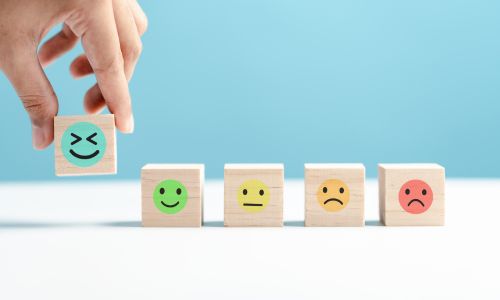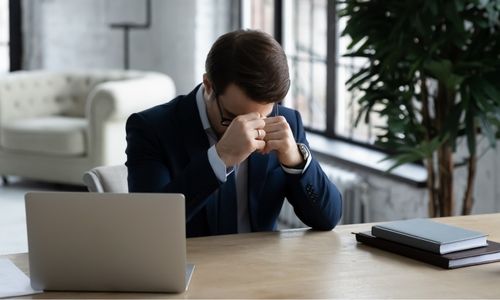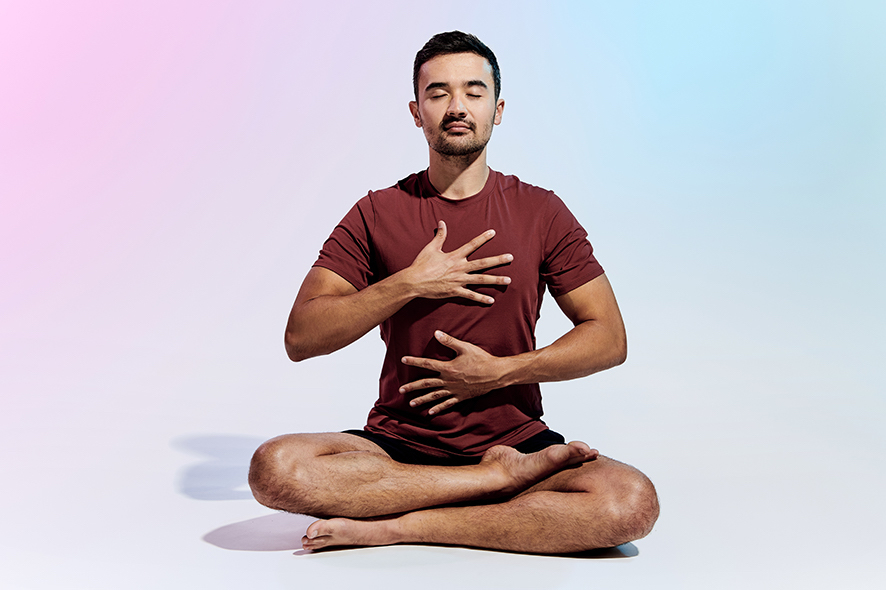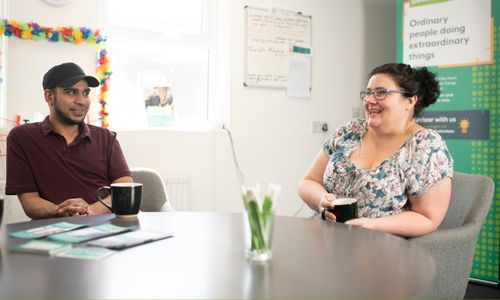Top Mental Health Conditions in UK Workplaces
Stress, depression and anxiety affect us all at some point, so what does that mean for UK workplaces?
Stress, depression and anxiety affect us all at some point, so what does that mean for UK workplaces?
Have you ever cried out for a simpler, more manageable life, where you're unburdened by overwhelming tasks, your stress levels reduce, your productivity increases, as does your overall health and wellbeing? I think most of us will be familiar with this feeling from time to time.
With this in mind, I thought I’d share some insights with you all, after recently reading a book by Steve Magness called ‘Do Hard Things’. He suggests that the way to build resilience, create mental space, streamline tasks and reclaim your time, is based on four key behaviours:
Authenticity - be your true self in all your thoughts and actions. Align your expectations with reality. Embrace your real self and not others expectations of you. Set boundaries. Learn and get comfortable with saying ‘no’
Acknowledging Your Thoughts And Emotions - identify and interpret your thoughts and feelings without self judgement. Learn how to engage with your emotions and channel them. Recognise the positive and the negative. Counselling, journaling and meditation are good tools.
Learn to Respond Rather Than React - try to be present in the moment, without judgement. Create space between yourself and a stimulus. Give yourself the chance to process the situation, any thoughts and feelings before actively choosing how to respond. Mindfulness is great for this.
Drive - find your sense of purpose, your ‘why.’ Intrinsic motivation is more important and sustainable than extrinsic motivation. Understand whether you really want to do something. If you don't, is it something you need to decline, outsource or automate?
Magness advocates that it is only when we step away from the conventional myth of toughness, such as putting a brave face on or just keeping our heads down, and use these four key behaviours that we can enjoy true resilience and mental space.
We all try to do too much sometimes and when we do, it catches up with us emotionally, physically, socially, financially....the list goes on, but we owe it to ourselves to be happy and healthy. Look at where you can simplify certain areas of your day-to-day life and how you can help to lighten your load. By setting boundaries, removing or outsourcing tasks, creating mental space and embracing simplicity, will all result in reduced stress, increased productivity, and an improved sense of overall health and wellbeing - the good stuff!
This book is a good read for anyone interested in dealing with high stress challenges, work based or personal. I can highly recommend it.
Stress can affect an employee’s physical and mental health, altering their behaviour and relationships with colleagues. As a commonly cited cause of long-term absence from the workplace, its key for Managers to know how to recognise and manage the factors, that can cause work-related stress. Conducting stress risk assessments and reviewing the responsibilities and activities included in job roles are good starting points, to reduce the likelihood of stress developing.
Interview with Neil Shah, by Nikki Roy, Body Mechanics
Stress and Mental Health are now more frequently talked about in the media as wellbeing issues we need to manage personally to stay healthy. But what if the issue is much broader than this? How can stress and mental health be managed by our Government, the NHS, the workplace and wider society adopting a preemptive approach, rather than a retrospective one.
Here, Neil talks to us about his experience of stress and mental health, what stress is and how it impacts us all as individuals and as members of society, as well as offering some practical stress management resources.
In 2003 I had a personal experience with my mental health, which resulted in what was described at the time, as a breakdown. I actually now describe it more as a breakthrough. At the depths of that I didn’t actually want to be here anymore. The emotional and mental pain was so great, that I was happy to end my life.
My back story is, I started my first business at 24. I turned it into an international success, a multimillion pound business and then basically crashed and lost everything. That's why I had the breakdown.
I realised that the experience I’d had wasn’t a tragedy, it was actually the greatest gift I’ve ever been given. It was up to me to decide what to do with that gift.
There really wasn’t much to support a young person going through that kind of mental health challenge. No one was really taking the time to understand what I was going through. So I decided to do something about it. I set up The Stress Management Society, to offer support to people that are suffering from mental health challenges. Essentially inspiring and empowering them to do something about it.
We set up a research and consultancy organisation called International Wellbeing Insights, which goes into corporate organisations, to deliver mental health and wellbeing programmes, which in turn advanced all our non-commercial activity.
The sad statistic is that in W.E.I.R.D countries - western, educated, industrialised, rich and democratic - suicide is the main cause of death of men under the age of 45 and is rapidly becoming the same for those aged 15-29. It’s astonishing that even children under ten are having suicide thoughts and sadly many have followed through on those thoughts. It’s tragic. We are literally failing some of the most vulnerable members of our society. We have some serious societal failings where we don’t have the necessary support, and it's sad that lives lost to mental health don’t seem to matter as much as those lost to Covid.
Even with the support and right resources, it's not necessarily going to stop things; we can minimise, but we can’t stop it. With everything that’s been going on in the past two years things are getting worse, they’re not getting better.

When we came into existence, there didn’t seem to be a universal, commonly accepted definition of stress, which is a little bit challenging, because if the experts don’t necessarily agree, we’ll struggle with the general kind of labelling.
It was actually a chance discussion I had on a plane, with a Structural Engineer, a stress tester, who knew a lot about stress as a force in physics, as opposed to something that is a human experience. But what I found fascinating was that there was really quite a lot of crossover. I asked him what his definition of stress was and he told me Force over Area equals Pressure.
He said if you put enough load on bridges they will eventually collapse, but before it collapses you will know that it's not coping particularly well, because it will start to bow, buckle and creak. When it's giving us those signs, we’ve then got some choices around what we can do to stop it from collapsing. We can start to take some of that load off, or we can better support it using concrete blocks underneath the bridge to help it bear the load more effectively.
My immediate reaction was, hang on a minute, people are exactly the same. It doesn’t matter how mentally tough or resilient you are, every single one of us, if enough demand is placed on us, we too ultimately collapse. And before we collapse, we’ll know we’re struggling because we show those bowing, buckling, creaking signs through changes in behaviour and emotions. It's then that we have options to actually do something about it.
So our definition of stress is where demand exceeds resources. Where the demand placed on the individual exceeds their capacity or their ability to cope with that demand, or more simply put, when the bridge has got too much load on it.
The reason we developed that kind of language is because it very much appeals to the ‘masculine mind’ of structure, logic, process, solution and focus. The masculine mind doesn’t really deal well with emotions. It allows us to have emotion based conversations in a very visual and practical way, which makes it more accessible particularly when people find it hard to tap into their emotions.
Someone saying I feel depressed can be viewed as a sign of weakness, but approaching the subject from the view that the bridge is overloaded, what do I need to either strengthen it or to remove the load, gets easier for people to kind of engage in those conversations. It’s a commonsense foundation of discussion (Final sentence added in by Nikki Roy as a comment she made during the interview).
Neil Shah is the founder of International Wellbeing Insights and Chief De-Stressing Officer of The Stress Management Society.
A leading international expert on stress management and wellbeing, he is the author of Amazon #1 best-seller ‘Turning Negatives into Positives – An Introduction to Neurolinguistic Programming’ and ‘The 10-Step Stress Solution’
He is a renowned media personality on the subject of wellbeing, appearing regularly on BBC Breakfast, BBC Five Live and Sky Sunrise.
It's not a one size fits all solution. If we go back to the bridge analogy, what options do we have to remove some of the load and how can we better equip ourselves.
One of the key things is getting the basics right and that includes things like what are you consuming both physically and mentally. Are you consuming information that is inspiring and uplifting you? Do you live your life in the past or the future?
We have no control over past or future events, so being present actually allows us to consider really how best we can navigate the experiences that we’re having. Reflect and look for things that are worthy to be grateful for - they are there in every given moment of every given day.
At the moment, the thing I think we really need to focus on is the sense of community. There is a direct correlation over the last 40 years, that as society and community have degraded, issues around mental health have increased. We don’t operate as a society anymore. We don’t have this community. We have this consumer culture that has really focused on the individual. You don’t need to rely on a person or a group to be able to function. That individualism is creating a sense of isolation.
I think we need to start moving away from this notion that mental health is an individual issue. Mental health is a societal issue. If someone has a breakdown, or takes their own life, that is not their issue, that’s a societal failing. We are creating the circumstances where that individual wasn’t supported.
Our focus for Stress Awareness Month this year, is building #Community as we are #BetterTogether. When we can build empathy and can start to see the world through each other's eyes and learn how to be compassionate, we can come together to find common solutions for societal challenges. We don’t need more polarity fuelled by profanity, we need to find unity through the power of community.

The business community and business leaders have a vested interest in the solution around wellbeing, because there’s a direct correlation between happy, healthy staff and high productivity, performance and success. A good company to work for happens to be a successful company.
It also has a snowball effect because it impacts employees' families and therefore their communities. Company competitors, partners and suppliers suddenly start to pay attention. This is how we start to create ripples of positive change across society, by role modelling it.
Our campaign for this month is ‘Proactive not Reactive’.
We need to start getting more proactive around community building, wellbeing, inclusivity, diversity and engagement, and to move away from being reactive.
There’s significanly more chance of the suicide of someone close to you, than there is of them dying due to war or human violence, yet we don’t talk about it, we don’t understand the scale of the issue. We’ve let it get to the point where the main cause of death for a man aged 45 in Western society is suicide and even though that’s the case, we’re still not doing anything about it really. That’s absolutely tragic. 14.3% of all human beings who die every year, die as a result of their own hand. That’s incredible.
Your work is a crucial part of your wellbeing. Having meaningful, gainful employment will actually contribute to your wellbeing.
To me, meaningful employment is where you’re valued as a human being, you’re able to develop and contribute your skills in a way that enhances your employer's overall vision, and you are rewarded fairly for it. This is really where organisations need to consider is their profit to the detriment of people or do we have a balance? This is really what we should be considering because this is good for everybody.

Right now, we’re really trying to emphasise this message of community. I’m talking about where you start to understand that collectively, we have far more things in common than the things that separate us. So we’re helping to bring people together to share their experiences and to build this community, from a local to a global level.
Also another project we’re working on is through our charitable arm, we’re currently raising money and we’ve received some lottery money, to run programmes for youths and children, particularly 11-19 year olds.
We just started a project with Charlton Athletic football club called Level Up, to equip kids with the tools that they should
be taught at schools - personal resilience, managing their wellbeing, really understanding how to equip themselves with the skills, tools and confidence to be able to navigate this world that we find ourselves in.
The other one is a Mental Wellbeing Ambassadors Programme. A proactive approach where it shows you how to have those preemptive conversations, not to wait until someone’s bridge is about to collapse, but to be able to pick it up before the bowing and buckling stage, knowing how to engage them and how to refer them to the most appropriate support resources.
Neil has written two books that can help you with stress management, click on the links below to find out more.
We’re getting to a point where we’re more comfortable having this conversation. When Covid hit, mental health was sidelined. We’re slowly starting to see that come back up again, but it's put back the mental health progress back by 6 years. We’re back to where we were in 2016. And that for me is a real concern. Mental health didn’t just go away, because Covid came along, it actually got worse, so why have we stopped talking about it? Getting access to a Counsellor or someone on the NHS is next to impossible right now. I think it's going to take something quite prominent to put it back in our focus again. It shouldn’t take that.
Here is a link to my recommended resources: https://www.stress.org.uk/national-stress-awareness-month
Sign up to our newsletter
https://www.stress.org.uk/sign-up-to-our-stress-busting-newsletter/
The Stress Management Society Head Office: Suite C, Quay West, Salamander Quay, Harefield Middx, UB9 6NZ, UK.
Tel: 020 3371 3219
Email: info@stress.org.uk
Follow us on Social Media
Instagram : @thestressmanagementsociety
Facebook: @TheStressManagementSociety
Twitter: @StressMgtSoc
We all experience stress from time to time, it's a natural part of the hustle and bustle of life, however it can become an issue when stress reaches the point of overwhelm and we don’t feel able to competently manage our stress levels or to get them back into balance. Stress can manifest itself both mentally and physically, negatively impacting our overall health and wellbeing.
In this article we look at what mindfulness is and hope to provide you with some tools and resources to help you manage your stress levels regularly, working on the premise that prevention is better than cure - a little time spent managing your stress levels on a regular basis, will better place you to manage particularly stressful situations, when the time comes.
Mindfulness is a way in which we can slow down and gain awareness of ourselves; our thoughts, our biases and assumptions, our body, our environment, our relationships; it's a way to become present in the moment and to focus on what truly matters and what is within our control. It's a way of cleansing the mind and creating space for ourselves, of achieving a feeling of calm, regaining clarity and focus. Mindfulness can help rebalance our mental and physical health and elevate our resilience.
We all have a personal responsibility to ourselves to make sure we engage in self-care, but what about the duty of care our employers have towards us? How can mindfulness be incorporated into the workplace to enhance our experience and fulfilment within our job roles?
In a CIPD Update article on 23rd March, Kristian Adams highlighted some key issues around resilience and how Line Managers in particular, play a key role in influencing how resilient team members are. He hones in on the onus still being passed back onto the individual to ‘buck up’ and get on with things, something we know from experience, isn’t an acceptable nor an effective management technique. What about adopting a more human approach? What about allowing people to acknowledge and discuss their emotions and challenges? What about Mindful Management in the Workplace?
Mindfulness at work is increasingly gaining traction as a positive way to move forward in terms of people management. It brings the ‘human’ element back into the workplace and stops treating employees as a mere resource.

Both Mindful and CIPD have backed the value of mindfulness at work. CIPD reference survey evidence from Mind in 2015 and the Police Federation in 2018, which looks at the high stress levels of police service workers and how they can be reduced. Mindfulness was considered to be an option. A bespoke mindfulness course was developed - MindFit Cop - which was positioned as a form of strength training; a way to ensure workers were fit, healthy and resilient in order to do their job. The participants learned how to meditate and were taught about the science behind mindfulness and its practical applications.
Overall, results found that police service workers who felt they had little control over their work activities experienced more wellbeing benefit than those who felt they had more control to begin with. The research is thought to have positive implications for other high stress job roles and work environments.
By incorporating mindfulness into everyday work at all levels - an individual, a managerial and an organisational level - it benefits everyone. Managers are allowed to engage in authentic leadership and to help empower their employees. Employees experience improved wellbeing and transformative experiences and different ways to work. It allows for confidence, optimism, coherence and a sense of openness to flourish and moves away from the threat of stress and burnout. Mindfulness and resilience together make for a powerful management practice, but also as a way to move forward as a business with a strong competitive advantage.
Meditation for Beginners
Mindful offers a free introduction to practicing mindfulness on a daily basis over 5 days. Sign up by clicking here https://mailchi.mp/mindful/sfbcf98skw
Tips on How to Lower Stress in 7 days
The Stress Management Society offer a practical guide
https://www.stress.org.uk/home-2/reduce-stress-in-7-days/
Types of Mental Health - What is Stress
https://www.mind.org.uk/information-support/types-of-mental-health-problems/stress/what-is-stress/
This article first appeared as a blog on https://fiit.tv/
Sound too good to be true?
What if we told you that you already have that magic pill and it’s quite literally under your nose!
Breathwork is being tipped as the next revolution in health and wellness. Thanks to world-renowned teacher, Richie Bostock aka @thebreathguy, you too can try a series of classes on Fiit.
You may be thinking, why do you need breathing classes? After all, you’ve been breathing all your life!
Well, Breathwork involves specific breathing techniques that have the power to change our physical, mental and emotional states.
Oxygen is the body’s number one fuel source, and increasing oxygen levels in the body brings a whole host of benefits. That’s why elite athletes, Silicon Valley CEOs and world famous performers are turning to Breathwork to feel and perform at their best. And now you can too, without leaving your living room!
“It’s so simple! All you need is a comfortable space to lie down, listen to me and breath along as I lead you through a series of breathing flows that will leave you feeling amazing!” says Richie
Many of us today live in a state of high stress all the time which is so detrimental to our health and happiness. Some of us have forgotten what it even feels like to be relaxed.
“The cool thing about Breathwork is it can get you out of your mind in a few minutes. You’ll start to feel physical sensations and then go into a meditative state, without needing to know anything about meditation. I’ve had clients with insomnia have their first good night of sleep in decades after just one class!”
With Fiit, you can breathe with Richie whenever and wherever you want. Start with the Fundamentals classes and master the basics before progressing to more advanced classes. We know you’re going to love it.
But don’t just take our word for it! Check out what some of our members have to say after trying Richie’s classes for the first time:
This article first appeared as a blog on https://fiit.tv/
The mood-boosting benefits of regular exercise are often overshadowed by the physical gains. Most people work out to get in shape. To lose weight, build muscle or improve their athletic performance.
But when motivation wavers, it’s the mental rewards of regular exercise that encourage us to get back on the mat. Even the smallest improvements in our training patterns increase our sensitivity to dopamine receptors. So each workout becomes more of an accomplishment. A way to release stress and flood ourselves with feel good hormones.
At Fiit, we want to highlight the many ways in which exercise — of any kind — can improve mental wellbeing. And why it can be a constant source of motivation for everyone.
“Exercise is associated with a lower mental health burden across the globe, irrespective of age, race, gender, household income and education level.”
~ Dr Adam Chekroud, Assistant Professor of Psychiatry at Yale University.
In The Real Happy Pill, Dr. Anders Hansen describes exercise as one of the most effective ways to alleviate stress and anxiety, and improve mood levels.
“Modern neuroscience has shown that maybe the most important thing we can do for our brain — and therefore ourselves — is to be physically active.”
~ Anders Hansen
That doesn’t mean you have to go cardio crazy. A HIIT class is an excellent outlet for stress (especially if Jamie Ray’s got a say in it). But any dynamic movement will help you produce endorphins and enkephalins. And everything seems much more manageable once you’re fuelled with those coveted ‘happy hormones.’
Over the past few years, evidence has mounted suggesting Yoga is a ‘low risk, high yield’ approach to improving overall health. By lowering the heart rate and blood pressure as well as improving respiration, Yoga completely changes the way we respond to stress.
Combine it with breathwork and you’ll learn to retrain your nervous system. Find out more about the benefits of breathwork here.
Our solution: Whatever form of exercise you choose, make it regular. Work out 3+ times a week (easy to fit in with 25 minute classes) to experience long-term positive changes. And breathe deep

Many GPs now prescribe exercise as a treatment for depression, on its own or alongside other therapies. It can help manage symptoms but, more importantly, it can prevent them.
Often described as a ‘wonder drug,’ exercise improves blood supply and neuron signalling, growth and connections. It therefore has a direct and immediate impact on the brain.
According to the World Health Organization (WHO), more than 300 million people suffer from depression, globally. We believe exercise has the power to significantly reduce that number (with zero side effects).
Our solution: Researchers suggest as little as one hour a week of dynamic exercise can make the difference. Of course, the more you work out, the fitter you’ll be, but the mental benefits yield pretty quickly. Gamifying workouts has also been proven to increase both motivation and mental wellbeing. So naturally, we’re working on this. Watch this space.

The good news is, the brain fog that often comes with age can be prevented. The University of British Columbia recently conducted a study which proves aerobic exercise boosts the size of the hippocampus (a part of the brain responsible for verbal memory and learning).
That means cardio training protects you from developing dementia, as well as depression, anxiety and stress.
Our solution: 120 minutes of high-intensity training a week. That’s just two Fiit sessions every 7 days.
“To keep the body in good health is a duty. Otherwise we shall not be able to keep our mind strong and clear.”
~ Buddha
Now more than ever, we need to make mental health a priority. And in our experience, a strong mind leads to a healthy body. Make a small change today and you’ll soon feel the benefits.
Talking about Men’s Health is something we think needs to be encouraged and done more often.
We have featured stories from some of our about what causes them stress, how they manage that stress and their overall health and wellbeing.
We also polled you, our clients, to see how you manage your own health and wellbeing and the results of this are summarised in this article. Thank you to all those who completed the survey or shared their stories with us.
Age of respondents
All respondents were aged between 25 and 64 years old with the following breakdown.
50% were parents with over half having children under 11.
Most were in professional occupations or self-employed
We asked all respondents what they thought the biggest pressures were on men and the majority cited balancing family, life and work, mental health and work stress as the main pressures.
Stereotypes and the perception that men shouldn't show weakness also came high up on the list of pressures.
"The expectation to be the bread winner and enjoy manly pursuits (pub etc.), however it is better to have time away with your thoughts and talk about what's going on in your head."
Unsurprisingly the pandemic and uncertainty around employment also featured strongly in the responses we received.
Sport featured strongly as a way to cope with these pressures with a range of sports:
However, we also saw Yoga feature for a small number of people too.
Alongside sport, a range of hobbies were also mentioned including reading, travel, baking, music, movies and gaming.
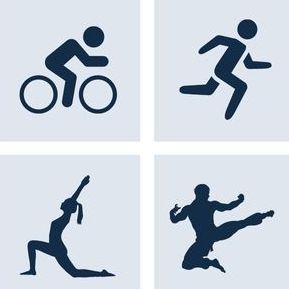
The stereotypical role of the male is changing, it is great that mental health is recognised and talked about more for men, however there is still a long way to go, here are some of the responses we received about the perception of masculinity.
"I think the modern world has just increased expectations of all genders to be able to do everything and achieve everything."
"It's starting to change, and thankfully. Masculinity (as well as femininity) in its 'traditional' terms should be eradicated. We're all human, and should do as we feel, not as some norms prescribe."
Given the age range of our respondents, we are unsurprised that many of you highlighted that you manage some form of physical or mental issue.
42.9% of you have a mental health condition - it is great that so many of you are able to share this and is a sign again of the way that the perception of masculinity is changing, however we hope that this number will drop as this is talked about more and you are able to gain the support you need.
With so many of you taking part in sports, finding that 57.1% of you have muscular/skeletal conditions was to be expected as although exercise is great for us some types of exercise can put additional pressure on our joints. This is where nutrition and other activities are important to support your body, particularly as you get older.
For me, physical exercise is an essential part of keeping my mental health as well as my physical health
We all know that diet as well as exercise is important to us and we were surprised to find that only 33.3% of you were getting your '5 a day'. A healthy diet is so important and how we fuel our body will have an effect on our overall health and wellbeing.
Alongside this, drinking enough water is also important and we were pleased that 66.7% of you were drinking over 2 litres a day.
There are strong links between diet, energy levels and mental health, so reviewing your dietary habits is a great stip to finding ways to cope with the day to day stresses we all face.

Ending positively it is great to see so many of you have really focused aims for your health and wellbeing moving forward.
These included:
It was evident from the survey that everyone has some form of stress in their life, which has the potential to become a negative influence, if it's not managed appropriately
However, despite this potential, all respondents associated building resilience with focusing on physical activity to maintain good mental health.
It's encouraging that the connection between the mind and the body is being actively recognised and that social pressures are being managed through nutrition, exercise, and social interaction, to achieve a sense of balance.
All respondents felt that some of the conventional stereotypes of masculinity - of being the breadwinner, of being strong, not showing emotion, and carrying on' - were still issues, but hopefully, by continuing to talk about this and by masculinity taking on multiple forms, these pressures can be reduced.
Article written by Samaritans
Whether you love to chit-chat or would rather avoid a conversation with someone you don’t know – a few words, however small, can make a huge difference to someone who may be struggling. It may even help save their life. Here’s what you need to know about Samaritans’ Small Talk Saves Lives campaign, which is relaunching in August as the nation prepares to readjust to life following pandemic restrictions, and why it’s so important we look out for one another.
Samaritans has worked in partnership with Network Rail and the wider rail industry for over 10 years to reduce suicides on the railways and support those affected by them.
The charity delivers suicide prevention training to rail staff and British Transport Police – giving more than 22,000 staff the confidence and skills to be able to help someone in need. While the training is designed for the rail industry, the central idea of using small talk to interrupt a person’s suicidal thoughts is simple yet effective - something everyone can do and can be used across a range of scenarios.

Jason Alexandre, Samaritans’ Network Rail training officer, explains more:
“It’s my role to provide people with the tools and confidence to be able to recognise someone who might need help and know how to approach them by starting up a simple conversation to get them to safety.
“Any intervention is better than none and it’s using skills they already have, in simply having a conversation that could potentially help save a life.”

Shona Gibbs, Samaritans’ Senior Project Manager for the Network Rail partnership, further elaborates:
“Research showed that the public could also have a big part to play in making interventions and saving lives. Small Talk Saves Lives aims to empower the public to trust their instincts if they think someone is vulnerable and recognise that they already have all it takes to save a life – just a little bit of small talk is enough to interrupt their suicidal thoughts and may be the help they need.”
Jason continues: “The pandemic has added to the pressures people face this year and it's shown just how important it is for us to support each other and provide a listening ear to those who may have been struggling - you too could help be there for someone and potentially save a life.
“At Samaritans, we are concerned for the long-term implications of the pandemic, particularly as the links between recessions, unemployment and suicide risk are well known – so support in these times is essential. As restrictions ease and people may be feeling anxious, it's so important we look after our mental health and others by checking in and encouraging people to reach out for support, whether it's with a friend, a colleague, or a confidential helpline like Samaritans. No matter what you're going through, Samaritans volunteers are available 25 hours a day, 365 days a year. Call on 116 123 or email jo@samaritans.org"
How people act when they are struggling to cope is different for everyone. Common signs include looking distant, withdrawn, or upset or in an isolated spot.
START the conversation - Small talk is a great start. You can ask them if they are okay, comment on the weather, introduce yourself and encourage them to talk. There may be some silences before they respond, but just try to be yourself.
ALERT others - You don’t have to manage this alone. If you’re at a train station, get the attention of a member of staff, ask a passer-by to alert someone or call the police. Ask the person if there’s someone you can call for them.
MOVE them to safety - Encourage them to sit down somewhere safe and quiet, you can suggest a hot drink. You could mention sources of help, including Samaritans and their GP, as well as friends and family.
You might be worried that you’ll make things worse, but there’s no evidence to suggest that you will.
There’s no right or wrong way to approach someone. Trust your instincts and remember that you chat with people every day. You may still be helping even if you don’t get a response right away. Simply talking to someone and interrupting their thoughts may be all it takes to encourage them to reach out for support.
Use simple questions such as ‘It’s a warm evening isn’t it?’, ‘What’s your name?’ or ‘Do you need any help?’
If the situation is an emergency or if you don’t feel it’s safe to make an approach, call 999 – don’t make physical contact.
Your help can make a huge difference, but it might impact you too. You might feel emotional afterwards and you might what to talk about what’s happened.
Written by Tim Moss
Tim Moss is a record-breaking adventurer whose expeditions include walking across frozen Lake Baikal in Siberia, crossing the Wahiba desert on foot and making first British ascents in the Andes.
But he's biggest trip of all - cycling 13,000 miles around the world - almost never happened due to issues with his mental health.
In this article, Tim describes how a training ride went horribly wrong and almost ended his round-the-world plans before they had even begun.
Of those that know me or have stumbled across me online, many will know that a few years ago, I set off to cycle around the world.
What fewer will know is that the trip almost never happened due to issues with my mental health.
Two days into a training ride, I had a breakdown and had to go home. Over time, I lost all will to exercise, became scared of social interactions and, eventually, just hid behind my bed (literally). As a result, Laura and I had to cancel our round-the-world plans.
The fact that I had written extensively about cycling around the world but never mentioned depression was deliberate. I write about expeditions, not about myself. I don’t write about my personal life just as I don’t write about politics or sport.
But when I came to write the book about our trip, I found it was impossible to give an honest account without discussing the problems I faced.
As part of our preparation, we decided to cycle from Land’s End to John O’Groats. We had done several cycle tours before but thought that we should see how it felt to go away, knowing that the experience might be extended for a year or more. On the second day, however, Laura looked over her shoulder to see me pushing my bike uphill. She was perplexed. I had never needed to get off and push before.
‘You alright, love?’ she asked.
‘I just don’t seem to have the energy.’
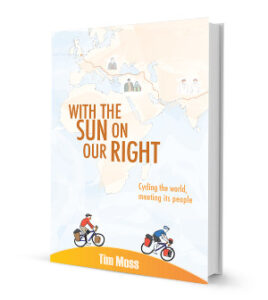
This was odd because I rode my bike all the time and had recently set the Guinness World Record for the longest distance cycled on a rickshaw. That had involved pedalling a huge, iron tricycle 1,000 miles from Scotland to London. As such, cycling up a hill, even a Cornish one, should have been fine.
When evening came, for some unknown reason, I could not face camping. Normally, I viewed camping as an opportunity, not a hardship. I loved nothing more than sleeping on top of a hill beneath the stars, but that night, I could not bring myself to do it. I was almost scared of it and Laura eventually had to find us a hotel.
We started on our bikes again the following day, but when we reached a town, I told Laura that I could not cycle any further and needed to sit down. She went off to get me some food (knowing that hunger was often the source of my problems), and by the time she got back, I was sitting on the floor with my head in my hands, crying.
I prided myself on never giving up. I was constantly looking for challenges and always driving myself harder. In Oman, for example, I used to ride a loop of the local oil compound every morning before breakfast and cycled so hard that when I slumped over my bike after achieving a personal best, passers-by would stop and ask if I was OK.
But that had started to feel futile. What was the point of riding my bike in circles, just to beat my own time? And what was the point of riding a bike across Cornwall? Why bother riding a bike at all?
Those feelings had been building for several months. Years of working at home, on my own, had been taking a toll. I often had no human interaction for days at a time and I had not been making a lot of money either, which, combined with the recent loss of a key client, ate away at my self-esteem.
These issues all came to a head in Cornwall, and the only response I could muster was to sit on the floor, crying.
‘What’s wrong, love?’ Laura asked when she came back from the shop.
‘I don’t know,’ I replied, ‘but I need to go home.’
*****
The doctor told me that I had depression. I was expecting that but pressed him on what was physically wrong with me.
OK, but why am I so tired all the time? Why can’t I run or cycle anymore?’
‘You don’t understand,’ he said. ‘That’s the depression too.’
I tried to pretend that this would not affect our plan to cycle around the world.
‘I’ll be alright once we get going,’ I said.
For years, I had been looking forward to this trip. I was not willing to accept that this was an illness that would prohibit me from disappearing on my bike for a year. I just convinced myself that everything was still on track for our departure.
But the evidence was in front of me. As well as having no will to exercise, I became scared of social interactions. I would dwell on the slightest negative comments for days and, eventually, just avoided talking to people. It got to the point where I felt the need to physically hide. Laura came into our bedroom one day to find me curled up in a ball behind our bed, with my eyes clamped shut and my fingers rammed into my ears. I felt completely overwhelmed and needed to shut the world away.
This odd defence mechanism grew into a habit. It became so normal that I even hid behind the bed when my parents came to visit, and sometimes Laura would have to bring my dinner to eat on the floor, curled up in the corner of our bedroom. A year earlier, I had crossed a desert, run an ultramarathon and broken a world record. Now I was reduced to hiding under beds.
Still, I could not let myself believe that anything would get in the way of our big trip. It was the one thing that I was holding on to and I was not yet ready to let it go. I insisted that I would be fine, and we pressed ahead with planning our ride around the world. But when Laura tried to hand in her notice at work, she was crying so much that her boss suggested she take a little longer to think about it. She knew that I was not in a fit state to go travelling and, slowly, she helped me realise that myself.
With time and treatment, I got better and, the following year, we set off to start cycling around the world (which is what the rest of my book is about).
 It’s easy to portray a certain version of yourself through social media. In my case, I just show the adventurous side and I do that to encourage others to undertake adventures themselves.
It’s easy to portray a certain version of yourself through social media. In my case, I just show the adventurous side and I do that to encourage others to undertake adventures themselves.
However, presenting a professionalised persona risks perpetuating an ‘us’ and ‘them’ situation in which adventurers with slick websites make it look like adventure is only for professionals with specialist skills and corporate sponsors. It is not.
That is the reason I publish the costs of my expeditions and the earnings of my website. It shows that my trips are not expensive or funded by sponsorship. It is also why I showcase other peoples’ adventures (like these guys crossing the Wahiba and everyone who’s won my grant). I want to ram home the message that anyone can have an adventure and that, just because I have a blog, I’m no different.
I hope that, through my website, people will see that it is OK to go on an adventure without expedition experience and without corporate sponsorship. And I hope that by adding to the chorus of adventurers* speaking about their mental health issues, people will realise that that’s OK too.
(*Like Sarah Outen, Emily Chappell, Kev Shannon, Juliana Buhring and Jake McManus, to name a few off the top of my head)
Tim continues with his adventures, now with two kids in tow. At the time of writing, he was cycling with them across the Shetland Islands. You can read more about this and his other adventures at www.thenextchallenge.org.

